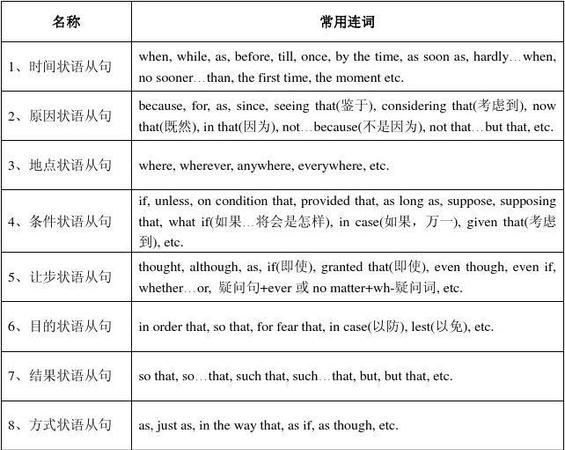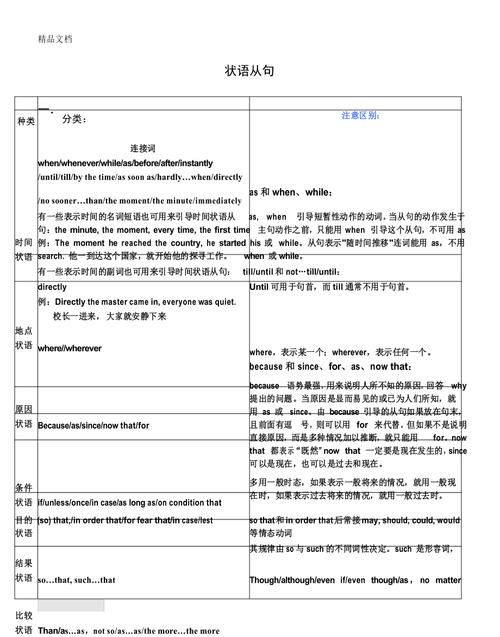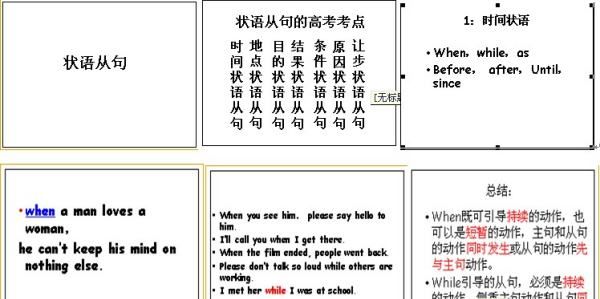本文目录
方式状语从句和比较状语从句
1、方式状语从句通常由as, (just) as…so…, as if, as though, by,with引导,多用来谈论某人的行为或者做某事的方式。
2、as引导方式状语从句
在英文中,as引导方式状语从句是用来修饰句子谓语部分的。请看例句:
1)Darwin had a phrase to describe those ignorsnt of evolution:they “look at an organic being as a savage looks at a ship,as at something wholly beyond his comprehension”.
妙语点睛:这里的as a savage looks at a ship做状语,表示方式,修饰主句的谓语部分look at an organic being。此外,这里有一个形容词短语ignorant of evolution做定语,后置修饰those。
译文:达尔文有句话描写那些不懂得进化论的人们:他们“看待一种生物就像野蛮人看着船一样,把它视为他们完全不能理解的东西。”
3、as引导方式状语从句可倒装
as引导方式状语从句可以采用倒装结构,此时的结构一般是“as+助动词+主语,as往往是代替被省略的谓语部分”。
Some asian nations and regions reiterated their opposition to a war,as did many og their citizens who worry Bush has already given up on hopes for a peaceful resolution to the crisis.
妙语点睛:这里as引导的从句的主语是many of their citizens,被后置,故是一个倒装结构,完整的句子相当于as many of their citizens...reiterated their opposition to a war.
译文:一些亚洲国家和地区重申了他们反对战争的立场,他们的许多公民也持同样的立场,因为他们担心小布什已经放弃了和平解决这一危机的希望。

现在分词做方式状语举例
方式状语从句在高考中常见的引导词有表示“像……”的as和表示“好像……”的as if/as though,例如:Let’s study as Lei Feng studied.让我们像雷锋那样学习吧.// Think as I think.像我这样去想.// He talks as if/though he is drunk.从他谈话的样子来看他好像醉了.方式状语从句通常由as,(just) as…so…,as if,as though引导.1) as,(just) as…so…引导的方式状语从句通常位于主句后,但在(just) as…so…结构中位于句首,这时as从句带有比喻的含义,意思是"正如…","就像",多用于正式文体,例如:Always do to the others as you would be done by.你希望人家怎样待你,你就要怎样待人.As water is to fish,so air is to man.我们离不开空气,犹如鱼儿离不开水.Just as we sweep our rooms,so we should sweep backward ideas from our minds.正如打扫房屋一样,我们也要扫除我们头脑中落后的东西.2) as if,as though 两者的意义和用法相同,引出的状语从句谓语多用虚拟语气,表示与事实相反,有时也用陈述语气,表示所说情况是事实或实现的可能性较大.汉译常作"仿佛……似的","好像……似的",例如:They completely ignore these facts as if (as though) they never existed.他们完全忽略了这些事实,就仿佛它不存在似的.(与事实相反,谓语用虚拟语气.) He looks as if (as though) he had been hit by lighting.他那样子就像被雷击了似的.(与事实相反,谓语用虚拟语气.) It looks as if the weather may pick up very soon.看来天气很快就会好起来.(实现的可能性较大,谓语用陈述语气.) 说明:as if / as though也可以引导一个分词短语、不定式短语或无动词短语,例如:He stared at me as if seeing me for first time.他目不转睛地看着我,就像第一次看见我似的.He cleared his throat as if to say something.他清了清嗓子,像要说什么似的.The waves dashed on the rocks as if in anger.波涛冲击着岩石,好像很愤怒.例题解析 [考题1] When a pencil is partly in a glass of water,it looks as if it ____.(1995) A.breaks B.has broken C.were broken D.had been broken [答案] C [解析] 当说话者认为句子所述的是真实情况或者是极有可能发生、 存在的情况时,as if/though引导的方式状语从句需用陈述语气形式.但表示所叙述的情况与事实相反时as if从句中应使用虚拟语气.注意比较以下两个例句:He walks as if he is drunk.He walks as if he were drunk.前一句表示“他已经醉了”,后一句则表示“他没有醉”.[考题2] Eliza remembers everything exactly as if it ____ yesterday.(2006) A.was happening B.happens C.has happened D.happened [答案] D [解析] as if后的谓语动词应采用一般过去时的形式与状语yesterday搭配,表示对现在真实情况的虚拟.

时间状语从句题目及解析
Adverbial Clauses
状语从句 1.分类
英语状语从句可表示时间、地点、条件、方式、让步、原因、比较、目的、结果等意义。不同的状语从句要求不同的连词或相当于连词的词组引出。以下是常用的引导状语从句的连词:
时间状语:when, while, as, before, after, since, until, the moment, as soon as
地点状语:where, wherever
条件状语:if, unless, as/so long as, suppose
方式状语:as, as if, as though
让步状语:though, although, even if, even though
原因状语:as, because, since, now that
比较状语:as...as, than, the...the, not so...as
目的状语:so that, in order that, for fear that, in case
结果状语:so that, so...that, such...that, that 2.时间状语从句
The street were less crowded when Mr.Budd let him out.
巴德先生让他出来的时候,街上行人已少了一些。
I'll come back as soon as is over.
一下课我就回来。
Please don't go anywhere before I come back.
我回来之前,哪儿也别去。
The telephone rang while I was having a bath.
我洗澡时,电话铃响了。 1)表示将来时间时,时间状语从句须用一般时态代替将来时态。
We will go fishing if it is fine tomorrow.
如果明天晴,我们就去钓鱼。
Soon after you jump, the parachute will open.
你一跳,降落伞就会打开。 2)when, while, as在引导时间状语从句时的区别:when表示从句的动作与主句的动作一个紧接着一个发生,也可表示从句动作在主句动作之前或之后发生。从时间上来说,它既可指一段时间,也可指某一具体时刻。
She opened the door when she heard the door bell.
她听到门铃响就把门打开了。
When he called, I was making lunch in the kitchen.
他来电话时,我正在厨房做午餐。
I used to eat in small restaurants when I was in London.
我在伦敦时,常在小饭馆吃饭。
I'll tell him about in when I see him.
我看到他时我会告诉他的。 while表示从句的动作与主句的动作同时发生,从句动作往往是有延续性的,因此从句所用的谓语动词往往是延续性的动词。从时间上来说,while指一段时间。
The light went out while I was reading the newspaper.
我正在读报时,灯灭了。
He repaired the leaking tab while the rest of the family were watching TV.
家里其他人在看电视的时候,他把漏水的龙头给修好了。
as表示某事发生的过程中另一件事发生了,亦可用来表示两个同时发生的动作。
As I drove past the crossroads, a red car suddenly shot right past me.
我开车过十字路口时,一辆红色的轿车突然从我旁边飞驰而过。
A look of surprise came into his eyes as he read the message.
他读着条子,眼里流露出吃惊的神情。
As he did so he nearly ran into a large man who suddenly came in through the doorway.
就在他这么做的时候,他几乎与一个突然进来大个子撞了个满怀。 3.地点状语从句
where, wherever引导地点状语,意思与in/at/to/the place where接近。
I'll drive you wherever you are going.
你去任何地方我都开车送你去。
You have the right to live where you want.
你有权住在你想住的地方。
It's your fault that she is where she is.
她落到今天这个地步是你的错。
Where there is a will, there is a way.
有志者事竟成。 4.原因状语从句
引导原因状语从句的连词主要有because, as, since。because表示的语气最强,通常用于回答以疑问词why引导的疑问句。as和since表示的原因通常对方是知道的,since较as正式。because可以代替as, since,但as和since不一定能代替because。
He failed the exam because he didn't study hard.
他考试不及格是因为他学习不努力。
He distrusted me because I was new.
因为我是新来的所以他不信任我。
As it is raining, you'd better take a taxi.
正在下雨,你最好乘出租车。
As all seats were full, he stood up and gave up his to an old lady.
由于所有的座位都有人了,他就站起来把他的座位让给了一位老太太。
Since you are going, I'll go, too.
既然你要去,那我也去。
Since you have no objection, let's get started.
既然你不反对,那就让我们干吧。 5.目的状语从句
She ate her supper quickly so she could go out early.
她很快吃晚饭以便能早点出来。
They drove with both windows closed so that he would not catch cold.
他们开车时把两边的窗子都关上了,这样他就不会感冒。
Speak clearly so that they will understand you.
说话清楚点好让他们明白你的意思。
These men risk their lives in order that we may live more safely.
这些人冒着生命危险是为了让我们更加安全地生活。
Don't let your baby play with your watch in case he damages it.
别让你的孩子玩你的表以免把表弄坏。
I'll buy some beer in case Uncle Tom drops in at the weekend.
我要去买些啤酒以备周末汤姆叔叔来。
目的状语从句中常用can/could, may/might, will/would, shall/should等情态动词。
He wore a pair of sunglasses for fear that he would/might be recognized.
为了不让人认出来,他戴了一副墨镜。 6.让步状语从句
Though we have worked with John for years, we don't know much about his family.
尽管我们和约翰一起工作多年,我们对他的家庭还是了解甚少。
Even though you don't like him, you should be polite.
尽管你不喜欢他,你还是应该礼貌一些。
Although we were poor, we were very happy.
尽管我们穷,但我们很快乐。
He is a good man even though I don't always agree with him.
尽管我们的看法有时不同,但他人是好的。
Even if he proves to be wrong, he wouldn't admit it.
即使已经证明他错了,他也不会承认。
as也可引导让步状语从句,但只用在形容词/副词+as+主语+谓语的结构中。这一结构主要用于正式文体,不用于非正式文体。
Patient as he was, he had intention of waiting for three hours.
尽管他很有耐心,但他还是不打算等三个小时。
Young as he is, she has five years of teaching behind her.
尽管她还年轻,但她已经有五年的教学经历了。
Hard as he tried, he couldn't cope with his responsibilities as manager.
尽管他很努力,但他实在不能胜任经理的职责。 7.方式状语从句
Do as you are told.
叫你怎么做你就怎么做。
I've changed the title of the essay as you suggested.
我已经照你所建议的那样把文章的题目改了。
She had never spoken so excitedly as she did then.
她说话从来也没有像那会儿那样激动过。
The other day he spoke about John as if he knew him.
前两天他谈起约翰,就好象他认识他似的。
I remember the whole thing as if it had happened yesterday.
整件事我都记得,仿佛它就发生在昨天。
He told us what had happened yesterday as if he had witnessed the whole thing.
他把昨天发生的事情都告诉了我们,就像是他亲眼目睹了一切似的。 8.结果状语从句
One of her lungs is affected a little so she has to rest.
他的一叶肺有点感染,所以她得休息。
I missed the bus so I didn't get home until very late in the evening.
我没赶上汽车,所以晚上很晚才到家。
His father works so late every day that he hardly ever sees him.
他父亲每天都工作到很晚,他几乎见不到他。
His heart beat so fast that he could hardly breathe.
他的心脏跳得那么快,他几乎不能呼吸了。
It gave him such a shock that his face turned white.
这使他大吃一惊,以至他的脸都白了。
What's the matter with you that you look so worried?
你看上去忧心忡忡的,出什么事了?

状语从句九大类型及例句
一、时间状语从句 常用引导词:when(在…时), as(当…时), while(在…期间), as soon as(一……就……), before(在…之前), after(在...之后), since(自从...以来) , not...until(直到…才)untill/till(直到…时)等 特殊引导词:the minute, the moment, the second, every time, the day,the instant( 瞬间,顷刻), immediately , directly(不久,立即), no sooner … than(一...就...), hardly …when(刚一...就...) , scarcely … when(刚...就.../一...就...) 当用no sooner … than,hardly …when,scarcely … when作为引导词的时候,从句要部分倒装。 I didn’t realize how special my mother was until I became an adult.
直到我成为了一个成年人我才意识到我的母亲是多么的特殊。
While John was watching TV, his wife was cooking.
当约翰看电视时,他的妻子正在做饭。
The children ran away from the orchard(果园), the moment they saw the guard.
孩子们一看到守卫就逃出了果园。
No sooner had I arrived home than it began to rain.
还没等我到家就开始下雨了。(<--- This translation is wrong. No sooner...than... means something happened right after something happened. )(我一到家就开始下雨了。)
Every time I listen to your advice, I get into trouble.
每当我听取你的建议时,我就会惹上麻烦。
二、地点状语从句
常用引导词:where
特殊引导词:wherever, anywhere, everywhere
Generally, air will be heavily polluted where there are factories.
一般来说,有工厂的地方空气污染就严重。
Wherever you go, you should work hard.
无论你去哪里,你都应该努力工作。
地点状语从句一般由连接副词where, wherever等引导,已经形成了固定的句型,例如:
Where there is no rain, farming is difficult or impossible.
在没有雨水的地方,耕作是困难的或根本不可能的。
They were good persons. Where they went, there they were warmly welcomed.
他们都是好人。因此他们走到哪里都受到热烈欢迎。
You should have put the book where you found it.
你应该把书放回原来的地方。
Where the Communist Party of China goes, there the people are liberated.
哪里有了中国共产党,哪里的人民就得解放。
Wherever the sea is , you will find seamen.
有海就有海员。
三、原因状语从句
常用引导词:because, since, as,
特殊引导词:seeing that, now that, in that, considering that, given that.
My friends dislike me because I’m handsome and successful.
我的朋友都不喜欢我,因为我又英俊又成功。
Now that everybody has come, let’s begin our conference.
既然每个人都到了,让我们开始我们的会议吧。
The higher income tax is harmful in that it may discourage people from trying to earn more.
更高的收入税是有害的,因为它或许会阻碍人们努力赚钱。
四、目的状语从句
常用引导词:so that, in order that
特殊引导词:lest, in case, for fear that,in the hope that, for the purpose that, to the end that
The boss asked the secretary to hurry up with the letters so that he could sign them.
老板要求秘书快写函件以便他能在上面签字。
The teacher raised his voice on purpose that the students in the back could hear more clearly.
为了让后面的学生听得更清楚,老师有意地提高了他的声音。注意,由for引导的是一个并列句,不是原因状语从句,但有表原因的意思,是并列连词
五、结果状语从句
常用引导词:so … that, such … that,
特殊引导词:such that, to the degree that, to the extent that, to such a degree that,
He got up so early that he caught the first bus.
他很早起床以便赶上第一班公共汽车
It’s such a good chance that we must not miss it.
这是一个好机会,千万不能错过它
To such a degree was he excited that he couldn’t sleep last night.
他激动到这个程度,以至于他昨晚睡不着
六、条件状语从句
常用引导词:if, unless,whether(whether...or not)
特殊引导词:as/so long as, only if, providing/provided that, supposing that, in case(美语中表条件,英语中表目的), on condition that
We’ll start our project if the president agrees.
如果总统同意,我们将开始我们的项目
You will certainly succeed so long as you keep on trying.
只要你继续努力,你一定会成功的。
Provided that there is no opposition, we shall hold the meeting here.
如果没有人反对,我们就在这里开会。
七、让步状语从句
常用引导词:though, although, even if, even though
特殊引导词: as(用在让步状语从句中必须要倒装),while ( 一般用在句首 ),no matter …, in spite of the fact that, whatever, whoever, wherever, whenever, however, whichever
Much as I respect him, I can’t agree to his proposal.
尽管我很尊敬他, 但是我却不同意他的建议。
The old man always enjoys swimming even though the weather is rough.
老人都很喜欢游泳,即使天气很恶劣。
No matter how hard he tried, she could not change her mind.
不论他如何努力,她都不会改变她的主意。
He won’t listen whatever you may say.
他不会听你说什么。
八、比较状语从句
常用引导词:as(同级比较), than(不同程度的比较)
特殊引导词:the more … the more … ; just as …, so…; A is to B what/as X is to Y; no … more than; not so much A as B
She is as bad-tempered as her mother.
她和她妈妈一样脾气很坏。
The house is three times as big as ours.
这房子是我们的三倍大。
The more you exercise, the healthier you will be.
你运动的越多,你就越健康。
Food is to men what oil is to machine.
食物之于人,犹如油之于机器。。
九、方式状语从句
常用引导词:as, as if, how
特殊引导词:the way
When in Rome, do as the Romans do.
入国问禁,入乡随俗。
She behaved as if she were the boss.
她表现得好像她是老板。
Sometimes we teach our children the way our parents have taught us.
有时,我们用父母教导我们的方式教导我们的孩子。
十、状语从句的省略
状语从句同时具备下列两个条件:①主句和从句的主语一致,或从句主语为it;②从句主要动词是be的某种形式。从句中的主语和be动词常可省略。例如:
When ( the museum is ) completed , the museum will be open to the public next year .
当博物馆完成,该博物馆将于明年向公众开放。
He’ll go to the seaside for his holiday if (it is ) possible.
如果可能,他将去海边度假的话
另外,比较状语从句经常省略。例如:
I’m taller than he (is tall ).
我比他高
The higher the temperature (is), the greater the pressure (is ).
温度越高,压力越大
就状语从句而言,有时为了使语言言简意赅,常常将状语从句进行简化。状语从句的简化现象在口语中较为普遍,而且在高考中的复现率也较高。因此,有必要对其进行全面、透彻的了解。
状语从句的简化现象常存在于以下五种状语从句中:①由if, unless等引导的条件状语从句;②由although, though, even if / though等引导的让步状语从句;③由when, while, as, before, after, until / till等引导的时间状语从句;④由as, as if等引导的方式状语从句;⑤由as, than等引导的比较状语从句。下面针对这五种情形作一归纳。
(1)当状语从句的主语是it,且谓语动词是be时,it和be要完全简化掉。例如:
If (it is) possible, he will help you out of the difficulty.
如果可能的话,他会帮你摆脱困境。
You must attend the meeting unless (it is) inconvenient to you。
除非情况对你来说不方便,否则你必须出席这次会议。
(2)当状语从句的主语和主句的主语一致时,从句可以将主语和be动词简化掉。常用于以下几种情形:
连词+形容词
As (he was) young, he learned how to ride a bike.
他小时候就学会了骑自行车。
Whenever (she is) free, she often goes shopping.
她有空就去逛商店。
Work hard when (you are) young, or you'll regret.
少壮不努力,老大徒伤悲。
连词+名词
While (he was) a young boy, he was always ready to help others.
他在孩子时代就乐于助人。
Although (he was) a farmer, now he is a famous director.
尽管他曾是个农民,但现在他是位著名的导演了。
连词+现在分词
As (she was) walking along the river bank, she was singing a pop song.
她沿着河堤边走边唱着流行歌曲。
Although (he is) doing his best in maths these days, he has still got no good marks.
尽管近来他一直在学数学,但他仍然没有取得好成绩。
连词+过去分词
He won't go there with us unless (he is) invited.
除非受到邀请,否则他不会和我们一道去那里。
The concert was a great success than (it was) expected
.这场音乐会出乎意料地取得了巨大成功。
连词+不定式
He stood up as if (he were) to say something.
当时他站起来好像要说什么。
He wouldn't solve the problem even if (he were) to take charge.
即使他来负责,他也解决不了这个问题。
连词+介词短语
She looked anxious as though (she was) in trouble.
她看上去很焦急,好像遇到了麻烦。
He had mastered the English language before (he was) in the USA.
他到美国之前就懂英语了。
注意:当从句主语和主句主语不一致时,从句部分要么用完全形式,要么用独立主格结构来表达。例如:
When the meeting was over, all the people went out of the meeting-room.
当会议结束时,人们都走出了会议室。(=The meeting over)

以上就是关于方式状语从句例句40个 ,方式状语从句和比较状语从句的全部内容,以及方式状语从句例句40个 的相关内容,希望能够帮到您。

